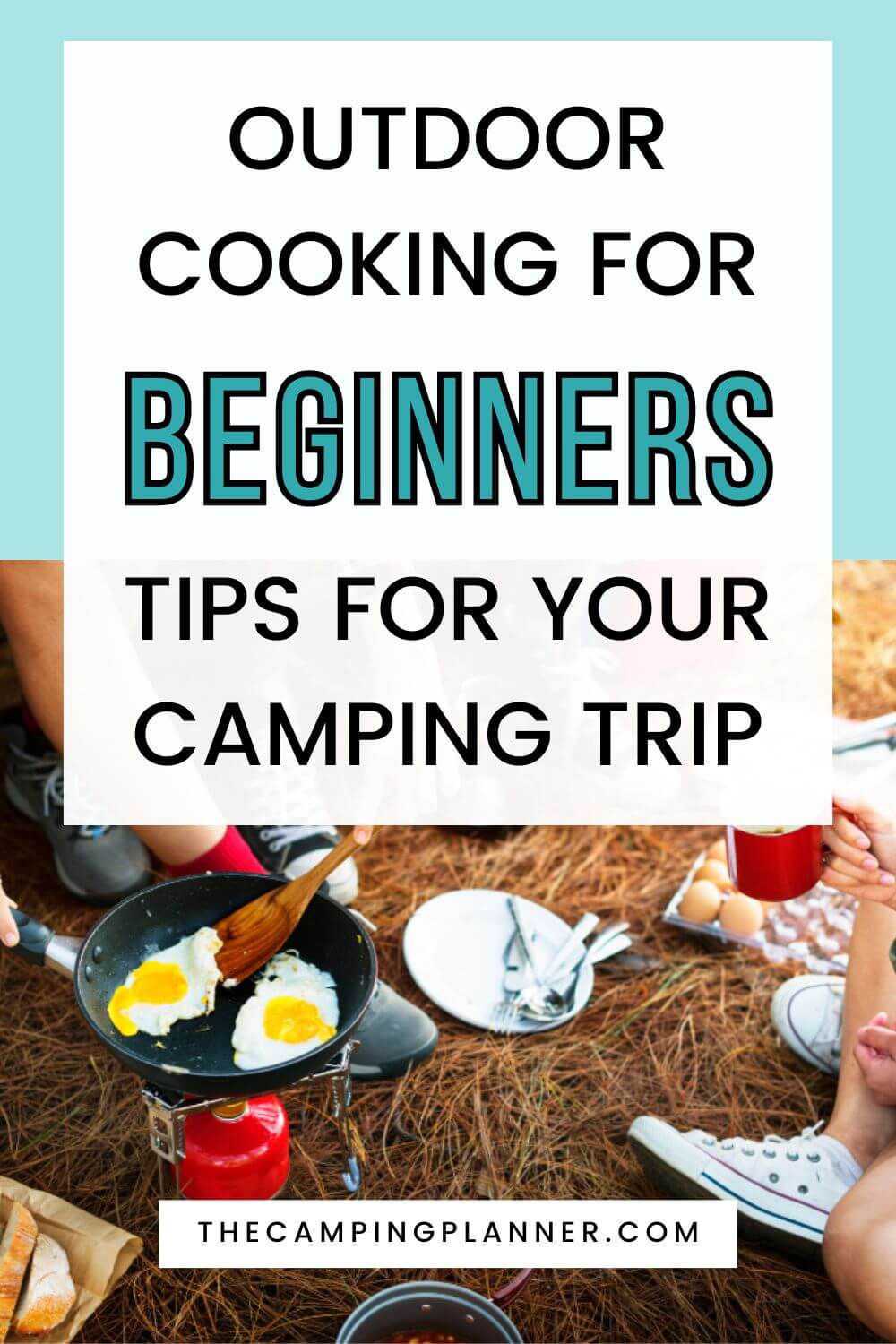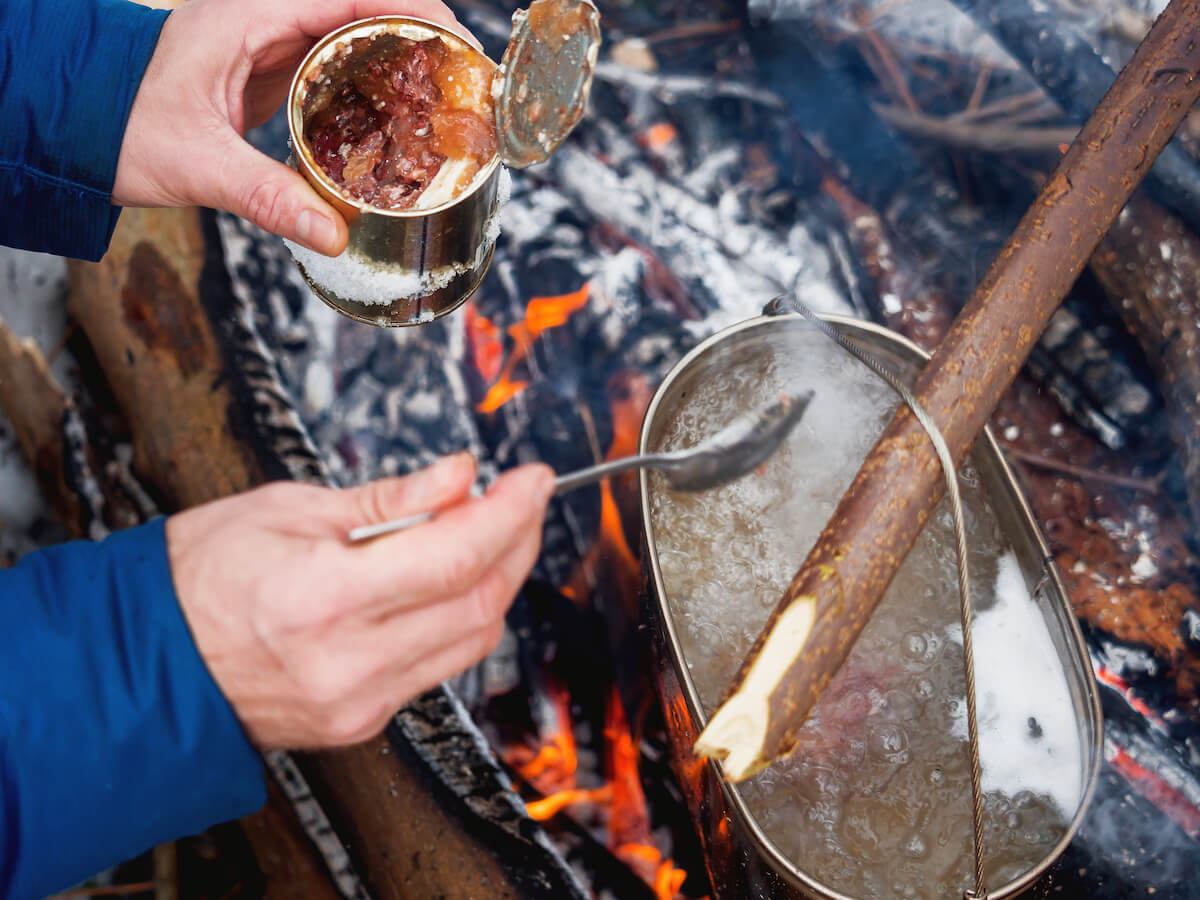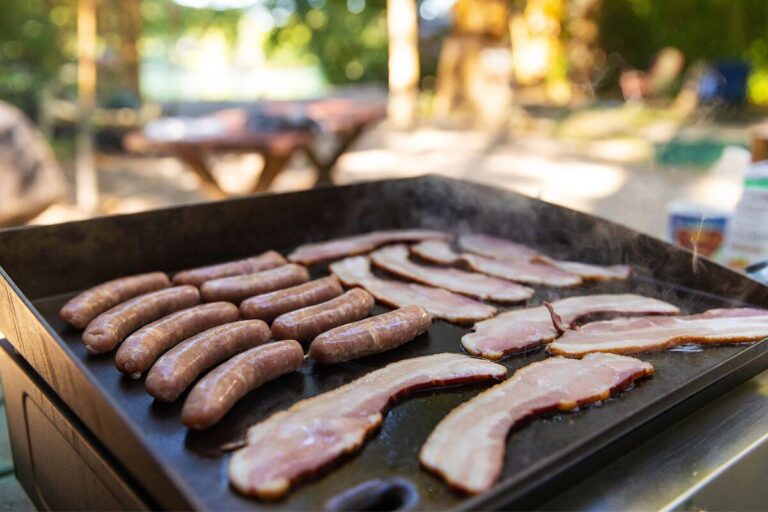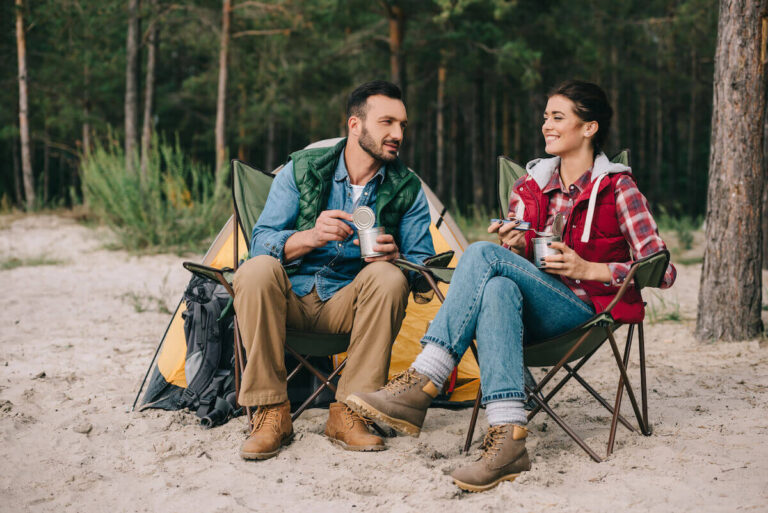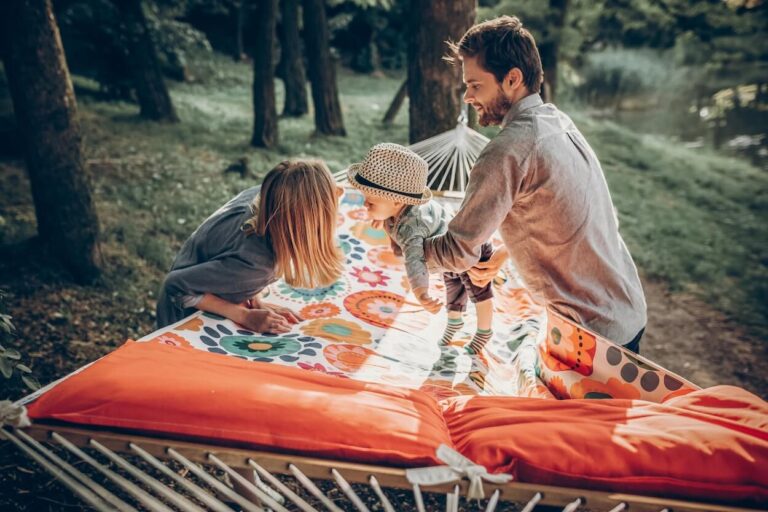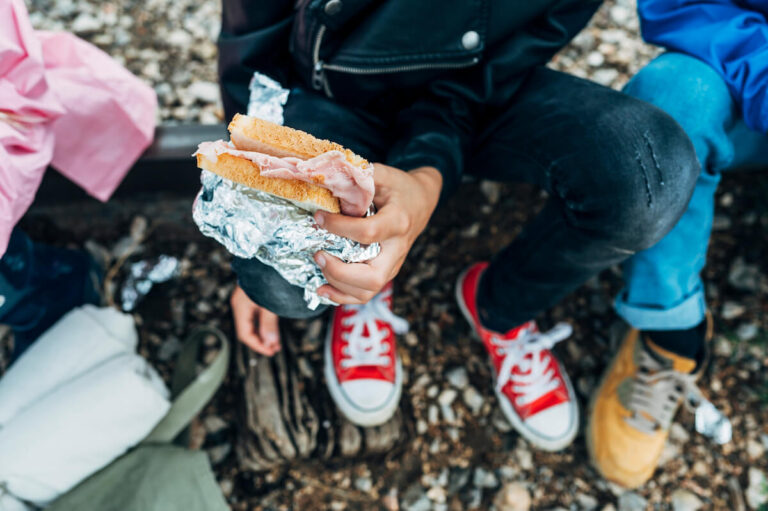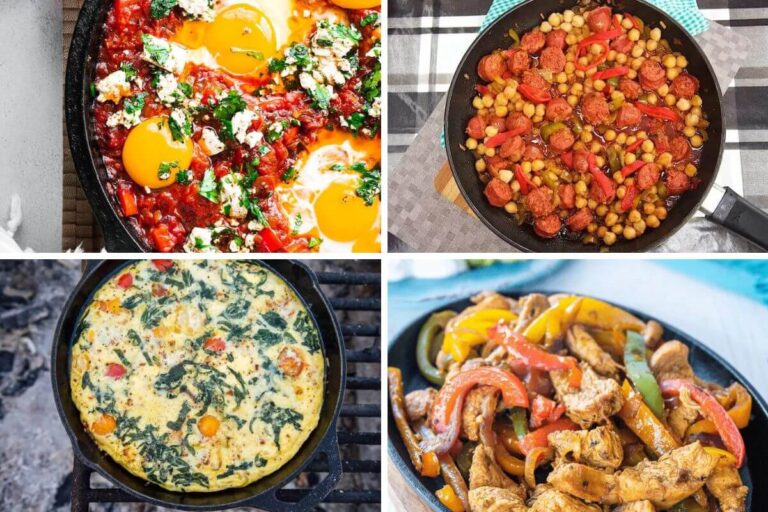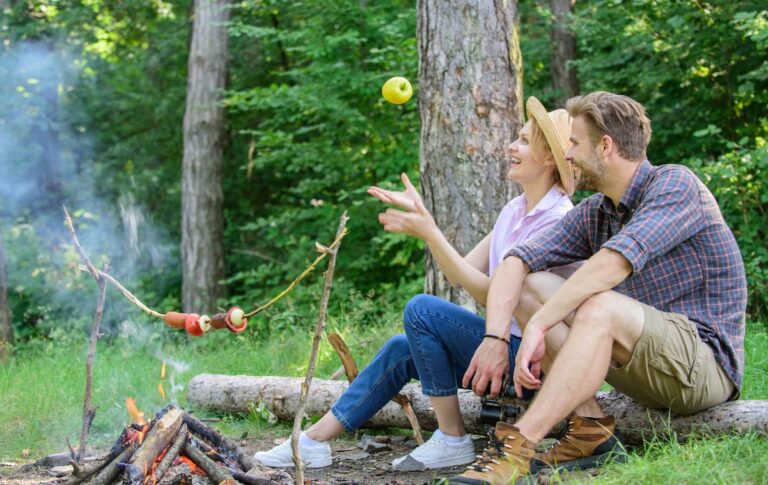Outdoor Cooking For Beginners: Tips For Your Camping Trip
Outdoor cooking is an essential part of camping. It allows campers to enjoy delicious meals while enjoying the great outdoors. However, outdoor cooking can be challenging, especially for those who are new to camping.
In this article, we will cover the basics of outdoor cooking and safety measures to ensure a safe and enjoyable camping experience.
Basics of Outdoor Cooking For Beginners
The first step in outdoor cooking is to choose the right equipment.
You can choose between a variety of cooking equipment, including stoves, grills, pie irons, and Dutch ovens.
When selecting cooking equipment, it is important to consider the type of camping trip, the number of people in the group, and the type of food to be cooked.
Where you are camping will play a role in this since some camping grounds have restrictions around outdoor fires, while others might have a camp kitchen you can use with shared facilities, allowing you to leave some of the usual essential camping gear at home.

Plan Your Meals Carefully
It might seem easy to just head to the grocery store and load up your cart with food that seems easy for a camping trip but that’s only going to end up in disaster when you either didn’t bring enough for your entire trip, or you end up with mix-matched ingredients that don’t go together so well.
This also means making sure you’ve got adequate food storage for all your perishable ingredients and to consider bringing a mix of non-perishable foods and canned foods for camping too. One pot skillet meals are a great way to keep your camp cooking simple.
Your camping meal plan doesn’t need to be excessively detailed but it does need to give you an idea of what you will each for each meal. This includes your camping breakfast and camping lunch meals too. And don’t forget the snacks.
These healthy snack ideas will make sure you’ve got nourishing snack options for all the active time outdoors.
Your meal plan can be as simple as a list of dinners, lunches and breakfasts for each day you’re camping.
Then you can use this plan to work out what ingredients, equipment and utensils you need to bring with you… before you start your grocery shop!
Preparing for Cooking Outdoors
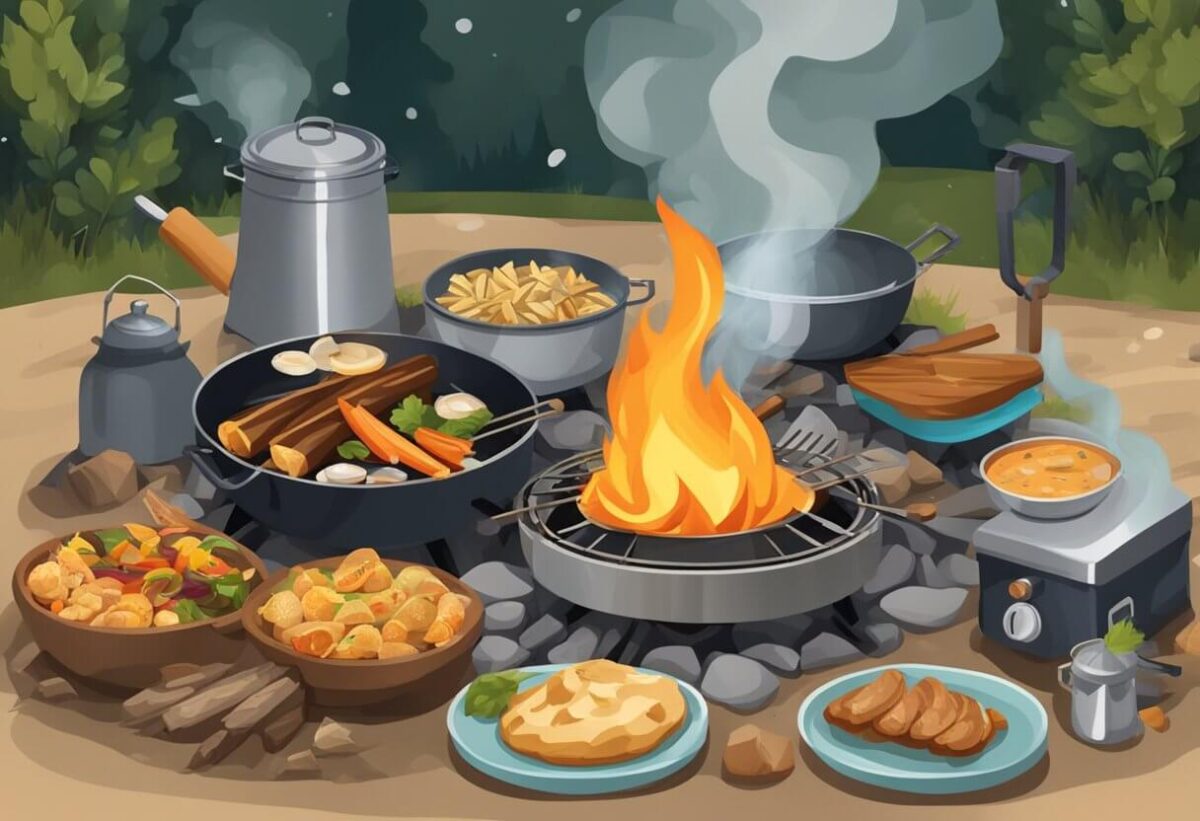
Once you know what equipment you want to use, you should prepare the cooking area.
This includes clearing the area of any debris, setting up a fire ring or stove, and ensuring that there is adequate ventilation.
You should also ensure that they have all the necessary utensils, such as tongs, spatulas, and knives.
When cooking outdoors, it is important to keep food safety in mind.
Always wash your hands before handling food and ensure that all food is cooked to the appropriate temperature.
You must also keep raw meat separate from other food items and store food properly to prevent spoilage. More on these safety tips below.
Outdoor Cooking Safety Tips
Outdoor cooking can be dangerous if proper safety measures are not followed.
Campers should always keep a fire extinguisher nearby and never leave a fire unattended. Especially if you’re camping during dry, windy weather or camping with young kids who may not realise the risk of getting too near a fire.
You should also ensure that their cooking area is a safe distance away from tents, trees, and other flammable items.
When using a stove or grill, campers should ensure that it is on a stable surface and away from any flammable materials. They should also never use a stove or grill inside a tent or other enclosed space.
Finally, you should always be aware of their surroundings and any potential hazards. This includes being mindful of wildlife in the area and ensuring that food is stored properly to prevent attracting animals.
By following these basic guidelines, you can enjoy delicious meals while staying safe and enjoying the great outdoors.
Camp Food Packing Tips
How you pack your food can play a big part in making your camp cooking easier. Especially when it means you don’t forget anything essential for your camping trip.
It’s also helpful to simplify your meals so that you don’t need to bring an excessive amount of extra ingredients, cooking utensils and equipment. We’re all about getting back to basics when it comes to outdoor cooking.
Here are some tips to help you pack for your camping trip:
- Use a checklist: Before packing your food, make a list of everything you need. This will help you avoid forgetting anything important and ensure you have enough food for your trip.
- Bring non-perishable foods: Non-perishable foods like canned goods, dried fruits, and nuts are great options for camping. They won’t spoil quickly and can be easily stored in your backpack.
- Pack food in airtight containers: To keep your food fresh and prevent it from getting soggy, pack it in airtight containers. This will also help prevent any spills or leaks.
- Use a cooler: If you’re bringing perishable foods like meat or dairy, use a cooler to keep them cold. Make sure to pack the cooler with ice or ice packs to keep the food at a safe temperature.
- Bring a portable stove: If you plan on cooking your lunch, bring a portable stove and fuel. This will allow you to cook your food on the go and enjoy a hot meal.
Camping Food Storage Tips
Food storage is essential for safety! The last thing you want is for someone to end up sick from contaminated food that was either not chilled properly or a case of raw and cooked foods intermixing. Eeek!
Especially if your entire camp party goes down with food poisoning or worse.
Here are some simple tips to help you store your food safely and avoid an unwanted visitors too:
- Keep food away from animals: When storing your food, make sure to keep it away from animals. Hang your food in a tree or store it in a bear-resistant container to prevent animals from getting to it.
- Store food in a cool, dry place: To prevent food from spoiling, store it in a cool, dry place. Avoid storing food in direct sunlight or in hot temperatures.
- Use separate containers for raw and cooked foods: To prevent cross-contamination, use separate containers for raw and cooked foods. This will help prevent the spread of bacteria and keep your food safe to eat.
- Label your food: If you’re bringing multiple containers of food, label them with the contents and date. This will help you keep track of what you have and ensure you eat the oldest food first.
Conclusion: Camp Cooking For Beginners
Getting started with outdoor cooking is a fun and exciting experience but it’s okay to feel a little daunted by it too! By following these tips, you can ensure your camping lunch stays fresh and safe to eat. And there are always fellow campers around to share their top tips if you find yourself struggling!
That’s the best part of camping… the community!
More camp food tips & ideas:
- Camping food list
- Healthy camping snacks
- Best canned foods for camping
- Easy camping lunch ideas
- One pot camping skillet recipes
